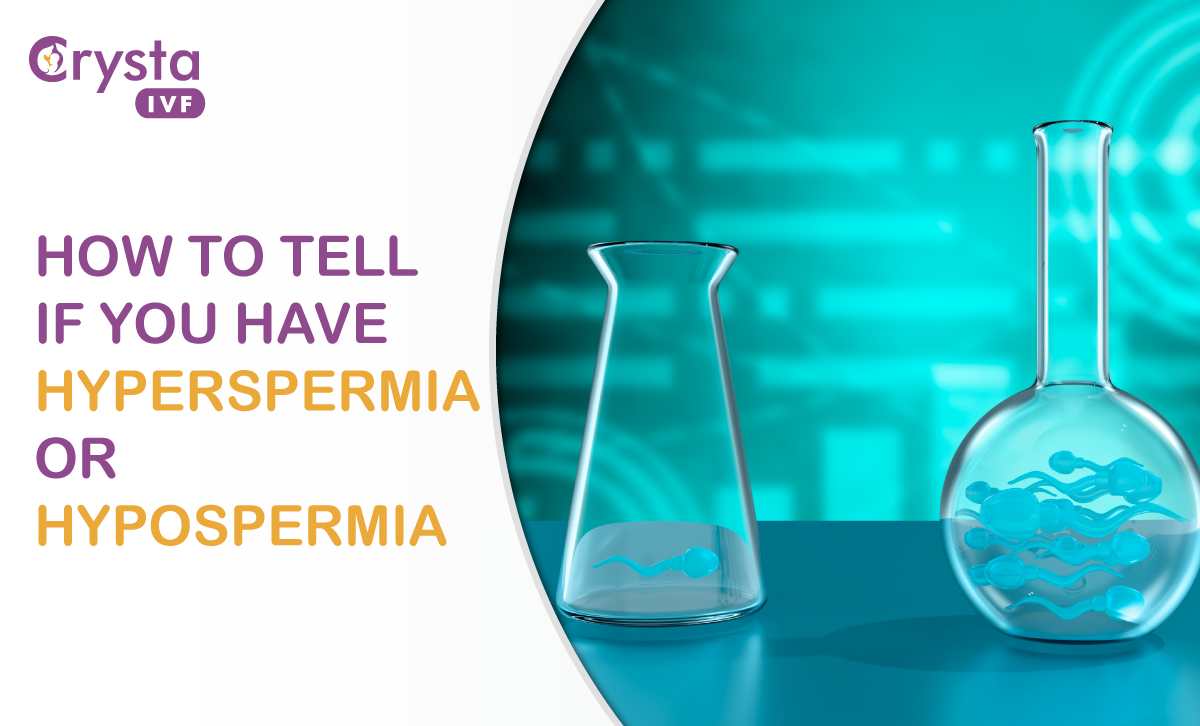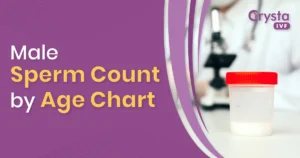Fertility issues in men are a growing concern. Still, the majority of the population is unaware of the different conditions and causes that are impacting their fertility health and overall well-being.
For decades, the primary reason for poor reproductive health and infertility in men has been related to sperm count, which has been linked to a variety of factors, including environmental toxins, smoking, poor nutrition, and even stress.
Hypospermia and Hyperspermia are two conditions that are lesser-known but may impact the men’s sperm quantity and hence the ability to conceive a child. Both conditions have different symptoms, causes, and treatments but share the same outcome, i.e., fertility complications.
As a result, it is becoming increasingly important for men to take steps to improve their fertility as early as possible and to be aware of factors & conditions that could impact their sperm count.
So, let’s briefly discuss both conditions and how they differ, and what to expect if you have any of these conditions.
Hypospermia Vs. Hyperspermia
Hypospermia is a condition where a male produces an abnormally low volume of semen (a fluid that contains sperm) when ejaculating. According to the World Health Organization (WHO), a person can be diagnosed with Hypospermia condition when he consistently produces less than 1.5 ml of semen in every single ejaculation.
Normal semen ejaculate is around 1.5-6 ml, of which about 1% by volume is sperm cells, although it may vary depending on factors such as mood, physical condition, and sexual activity.
Whereas hyperspermia is the opposite of hypospermia. Hyperspermia is the medical term for a condition in which a man has an abnormally large volume of semen during ejaculation.
Fertility experts generally define hyperspermia when the semen volume is above 5.5 milliliters (ml) per ejaculation, though it may vary and might go a little higher at 6 ml per ejaculation.
How Common Are Both These Conditions?
Hypospermia or low sperm count is among the primary and most common reasons for male infertility. In at least 50 percent of infertility cases, a male factor is a major contributing cause, and the primary reason for this is the low sperm count and quality.
Lower sperm count during ejaculation also lowers the possibility of sperm reaching the egg during conception. However, fewer sperm counts don’t always mean you won’t be able to conceive.
On the other hand, hyperspermia is relatively rare and less common than hypospermia. In one study, only around 4% men population has experienced this disease. Though, there is still no factual scientific research initiated on the condition.

How To Tell If You Have Hyperspermia Or Hyopspermia?
Whether or not you have fewer or excessive semen volume and sperm count, you may be able to notice the following signs and symptoms.
What are the Common Signs of Hypospermia?
Often the low volume of semen ejaculation doesn’t show any obvious symptoms, but in some cases, you may experience –
- Minimal ejaculation consistently
- Decreased sexual gratification
- Traces of blood in semen
- Foul odor
- Semen is too watery
- Other hormone abnormality
What are the Common Signs of Hyperspermia?
Many people with the condition may not notice any symptoms or their semen amount is larger than usual. Others may notice –
- Higher sex drive
- A larger amount of semen than usual
Hyperspermia is a rare condition and has significantly less obvious symptoms than any other condition that affects sperm quantity and quality. Hyperspermia also doesn’t necessarily involve a person’s health. But if you’re experiencing abnormal production of semen or problems with ejaculation, this could be a sign to see a doctor for a diagnosis.
How Do Both Conditions Affect Fertility?
Both conditions can lead to fertility issues, although different underlying medical conditions or abnormalities typically cause them. Low sperm count is often the common cause of male infertility, but hypospermia does not necessarily imply that a person is infertile. If the sperm cell quantity is good and shaped properly, there are good chances of conceiving.
Besides, hyperspermia doesn’t negatively affect a person’s health, but in rare cases, it might lead to lower fertility rates. Often men with higher semen volume during ejaculation have less sperm cell count than usual; this may cause the semen level to dilute.
This dilution can negatively affect fertility and the probability of conceiving. In other cases, conceiving may take longer than usual. However, most people with hyperspermia don’t have any issues with fertility as long as they have an average sperm count.
What are the Treatment Options Available?
In the majority of cases of hyperspermia, you don’t require treatment. However, if the condition is affecting your fertility or if it occurs along with low sperm count, then you need to see a doctor. Treatment typically depends on the cause and severity of the condition and may include lifestyle changes, medications (generally estrogen receptor blockers), and fertility treatments.
Hypospermia or low sperm count are often treated using medication to boost sperm production or surgeries to repair vas deferens or varicocele.
Simple lifestyle changes can also help improve fertility health. This includes quitting smoking & alcohol, managing stress, eating well, and maintaining a healthy weight.
What is Assisted Reproductive Technique?
In vitro fertilization (IVF), along with intracytoplasmic sperm injection (ICSI) & Intrauterine insemination (IUI), are also among the most effective treatments to overcome fertility issues such as low sperm count.
In the IVF ICSI process, ovaries are stimulated, eggs are retrieved from the ovaries, and a well-shaped sperm is carefully selected and fertilized in the lab to form an embryo.
The IUI process involves filtering and preparing a man’s sperm to be placed directly inside a woman’s uterus.
These advanced fertility treatments are recommended to those who are unable to conceive on their own because of medical conditions or if there are multiple infertility factors involved, such as poor sperm count along with blocked fallopian tubes in female partners.
Fertility treatments can improve the odds of a successful pregnancy.
In Conclusion
Conception is a complicated process that requires good sperm & egg production and health. Therefore, it is essential to take good care of them.
While hyperspermia is a rare condition, hypospermia is among the leading causes of male infertility. If you’re experiencing symptoms of any conditions and are concerned about it, you may wish to see a fertility expert for testing.
Talking with a fertility specialist at Crysta IVF clinic in Delhi NCR will help you investigate and diagnose the issue on time so you can explore your treatment options that can help you conceive and that are better for your reproductive health.




